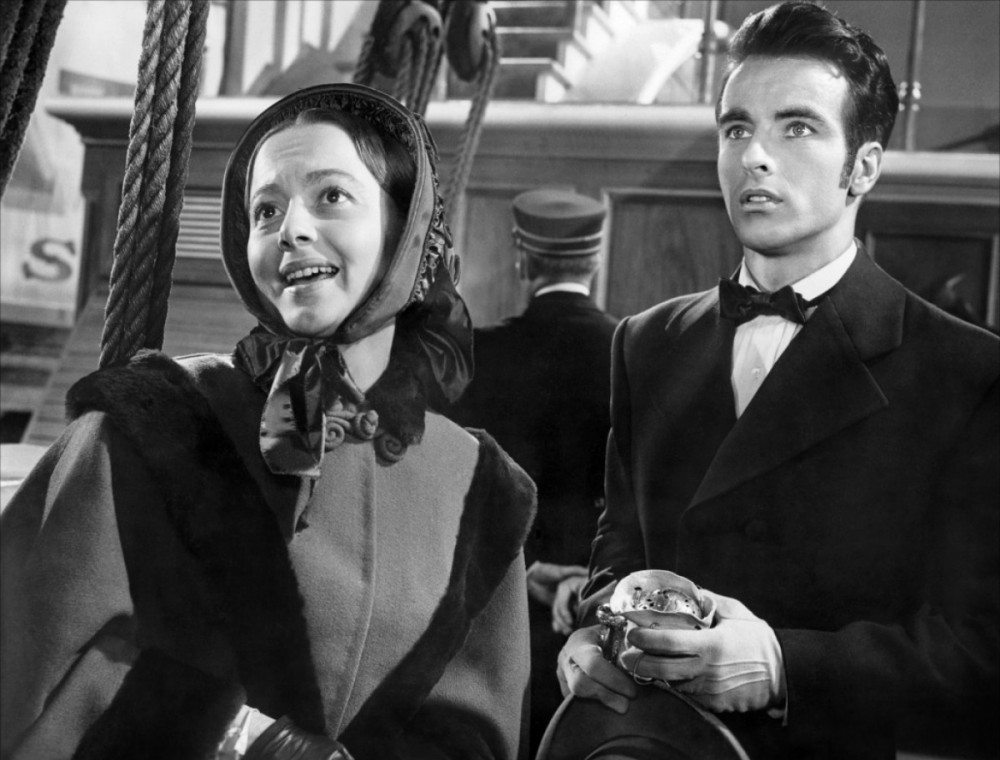Dir: William Wyler, Script: Ruth Goetz, Augustus Goetz | Cast: Montgomery Clift, Olivia De Havilland, Ralph Richardson, Miriam Hopkins, Vanessa Brown, Selena Royle, Betty Linley, Ray Collins, Mona Freema | US Drama | 110mins
Dame Olivia de Havilland, who has died aged 104, claimed her second Oscar for leading actress in William Wyler’s stirring drama, based on Henry James’s novel, ‘Washington Square’. She had already won an Academy Award for Mitchell Leisen’s To Each His Own (1946) and was one of the last surviving cast members of the 1939 epic Gone With the Wind.
As the sister of Joan Fontaine, she was not only an acclaimed actress but also a feisty member of the Hollywood studio system and had had the presence of mind to successfully sue her employers Warner Brothers in the famous “De Havilland decision” – that was a victory not only for female performers but but actors in general.
The Heiress was originally a play by Ruth Goetz that successfully ran on Broadway, with Basil Rathbone and Wendy Hiller headlining. Betty Linley is the only one to survive from the play, here reprising her role as Mrs Montgomery. Goetz’s husband Augustus then adapted the play for the screen
It’s a silken, subtle piece really, about human psychology and the impact that loss can have on a person and on those around them. Ralph Richardson plays the imposing, exacting father to a naïvely young Catherine Sloper (de Havilland), an heiress in waiting to a fortune, both from her already deceased mother and eventually, her father; inexperienced in the ways of the world at an age when she should be out meeting potential suitors, rather than staying at home endlessly threading tapestries.
The entire production was beset by off-screen politics. In the Forties and Fifties the director was often chosen by the actors and, indeed, de Havilland chose Wyler, confident he would push her enough to get the requisite strong performance. Word is that Method actor Montgomery didn’t regard her as much of an actress though and this, combined with Ralph Richardson improvising through his scenes in the hope of stealing as much of the limelight as possible, made it a very bruising experience for her. But de Havilland triumphs with a wonderful performance that garners Best Actress.
Wyler championed her and protected her throughout the shoot and their mutual support and belief in each other paid huge dividends, the film going on to take down four Oscars, including Best Actress for de Havilland, but also Costume, Art Direction and the last for a very interesting score by Aaron Copeland.
Copeland was a true talent, but what is less known is that Wyler was uncomfortable with his score and is rumoured to have had it heavily rewritten and re-orchestrated. Not the first time an Oscar has been awarded to the public face of something potentially ghost written, and certainly not the last. Copeland was ahead of his time with his spare score but traditionalist Wyler was unsure of this new sound.
Clift was chosen over Errol Flynn for his more subtle and committed brand of acting and indeed, learned the piano for the scenes where he plays and sings, however, he was unhappy with his performance in general and walked out of the premier, disgusted.
The Heiress doesn’t run as a standard ‘play by the book’ drama and is so much the better for it, especially when compared to so much of the current derivative screen fare, and Monty was perhaps not the best judge of his outstanding talents and certainly too harsh on himself. He is perfectly suited as the devastatingly handsome and charming love interest, whose true motives remain tantalisingly cloaked as the story unfolds.
Made in an era when depth of character, superlative crafting and inventive choices were the touchstone of filmmaking, this well-constructed drama is a tribute to a British star who has now taken her rightful place in the glittering Hollywood firmament. MT
THE HEIRESS

